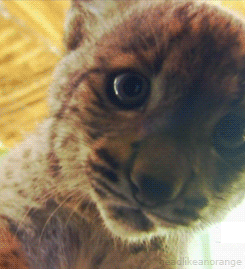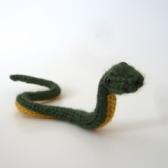Endangered Species Day highlights the plight of many at-risk and critically endangered species of wild animals, and highlights ways in which we can alter our behavior in small ways on a daily basis in order to help to protect and save these creatures.
The pudú (or pudu) is the smallest species of deer

Word of the Day
| |||
| Definition: | (noun) A morally unprincipled person. | ||
| Synonyms: | miscreant | ||
| Usage: | The prison was full of notorious reprobates. | ||
Male greater sage-grouse

Idiom of the Day
first impression— The initial, introductory evaluation upon meeting a person, encountering something, or experiencing a situation for the first time |
rare red wolf pups

History
| |||
 | Shakespeare penned 154 sonnets in his lifetime. Likely written sometime in the 1590s, the majority of the poems were first published in a 1609 work titled Shake-Speares Sonnets. The first 126 of the 154 sonnets are addressed to a young man whose identity has long intrigued scholars. The publisher, Thomas Thorpe, wrote a dedication to the first edition in which he claimed that a person with the initials WH had inspired the sonnets. | ||
| |||
 | Dolley Madison was the wife of US President James Madison, whom she married in 1794, after the death of her first husband. Noted for her magnificence as a hostess as well as for her charm, Dolley was an extremely popular first lady and was a great asset to Madison's political career. During the War of 1812, she saved many state papers and a portrait of George Washington from the advancing British soldiers. | ||
| |||
| Exercise may significantly reduce your risk for many types of cancer, including some of the most lethal forms of the disease, a large review suggests. | |||
1830 - The fountain pen was patented by H.D. Hyde.
1873 - Levi Strauss began marketing blue jeans with copper rivets.
1899 - Jacob German of New York City became the first driver to be arrested for speeding. The posted speed limit was 12 miles per hour.
1916 - Norman Rockwell’s first cover on "The Saturday Evening Post" appeared.
1927 - Charles Lindbergh took off from New York to cross the Atlantic for Paris aboard his airplane the "Spirit of St. Louis." The trip took 33 1/2 hours.
1932 - Amelia Earhart took off to fly solo across the Atlantic Ocean. She became the first woman to achieve the feat.
1978 - Mavis Hutchinson, at age 53, became the first woman to run across America. It took Hutchinson 69 days to run the 3,000 miles.
1980 - The submarine Nautilus was designated as a National Historic Landmark by the U.S. Secretary of the Interior.
1982 - TV’s "Barney Miller" was seen for the last time on ABC-TV.
1990 - The Hubble Space Telescope sent back its first photographs.
1993 - The final episode of "Cheers" was aired on NBC-TV.

DAILY SQU-EEK

If You Were Born Today, May 20
You possess much strength of character, warmth, sensuality, and intuition. While grounded and steady overall, you have a flair for the dramatic. You are exceptionally self-aware, and spend your life learning, largely through intuition and observation. You are loving and kind, but seldom forget a slight. Famous people born today: Honore de Balzac, Cher, James Stewart, Dolly Madison.

| Picture of the day | |
 |
The Richard's pipit (Anthus richardi) is a medium-sized passerine bird which breeds in open grasslands in northern Asia. It is a long-distance migrant moving to open lowlands in the Indian Subcontinent and Southeast Asia. Named after the French naturalist Monsieur Richard of Lunéville, this bird belongs to the pipit genus Anthus in the family Motacillidae. It was formerly lumped together with the Australasian, African, mountain and paddy field pipits in a single species, though these pipits are now commonly considered to be separate species.
|

Patagonian Paradise
Photograph by Roger Smith, National Geographic
The renowned beauty of Chile’s Patagonia region is exemplified in this photo of French Valley in Torres del Paine National Park, submitted by Roger Smith. The valley is ringed by the soaring granite peaks of the 19-mile Cordillera del Paine and is located at the center point of the park’s popular W circuit hike.

knit

knit
thanks, helen
knit

knit
knit

crochet
crochet
crochet
crochetCircle Slippers pattern by Erin Haberman
crochet

RECIPE
thanks, shelley

CROCKPOT RECIPE

Slow Cooker Stir-Fry Lo Mein
cheetah

SWEETS

CRAFTS

iberian lynx

CHILDREN'S CORNER ...



panda

PUZZLE

QUOTE


red-cockaded woodpecker,

CLEVER
thanks, sally. a real ad for a real changing colored toilet .. who knew?

monarch butterfly

EYE OPENER
thanks for sharing important things one might not even think about, patty

7 Things That Are Surprisingly Offensive
in Asia
afar
So you’re going to Asia. You’ve planned your trip, packed your bags and and maybe picked up a language guide. It’s all so exciting until you step off the airplane and the Japanese toilets are talking to you and you realize that you’re not in Kansas anymore. With your focus on new and different visuals, food, and language that are all so different, it can be easy to forget that cultural norms are different as well—and vary widely between countries. Try as you might, there are bound to be a few inadvertent blunders. And while you can always fall back on a friendly smile and apologetic attitude, here are a few tips on how to avoid really awkward situations.
1. Keep Your Hands Below the Neck
First and foremost, touching a person’s head is considered VERY rude is most parts of Asia. In Buddhist culture the head is the highest part of the body and thought of as sacred. The feet, on the other hand, are the lowest part of the body and considered dirty. So in countries with large Buddhist populations such as China, Thailand, Laosand Cambodia touching someone’s head is an incredibly invasive gesture. By the same token pointing with your feet, or showing the bottoms of your feet to anyone is equally offensive.
2. Master Chopstick Etiquette
If even thinking about using chopsticks makes you nervous, don’t worry—you are more than welcome to ask for a fork or a spoon. But if you’re adept at using chopsticks, don’t let your hard work go to waste by sticking your chopsticks upright in your rice. In China and Japan, this is considered very bad luck. Prevailing traveler superstition is that upright chopsticks resemble funeral incense and therefore symbolizes death. More traditionally, the connection comes from a part of the funeral services: rice is offered to the dead with his or her chopsticks stuck upright.
No matter which utensils you use, in China and Korea it’s considered presumptuous to keep your hands in your lap or to ask someone to pass food. Instead, participate in the action! Sharing is caring after all, so reach for the food you want and don’t feel shy about putting particularly delectable morsels on others’ plates. In this same convivial spirit, if someone in Beijing or Seoul offers or gives you food, it’s rude to reject the offer.
3. Eat with your hands
Maybe chopsticks aren’t your scene. In Nepal, India, and Muslim countries likeBangladesh, Indonesia, and Malaysia, it’s polite to eat with your hands. Scratch that; it’s polite to eat with your right hand—NEVER use the left hand. In those countries, food is eaten with the right hand and the left hand is reserved for certain sanitary activities. In fact, just try to leave your left hand out of it as much as possible—don’t hand or take things with the left hand Kathmandu, don’t point with the left hand in Dhaka…you get the picture.

4. Hold your liquor
Just as it’s rude to reject offered food, it’s rude to refuse to join in a toast. In Korea, when someone offers you a shot of soju or Korean beer, it’s a symbol of friendship and turning it down would be an affront. If you’re worried about getting too tipsy during particularly friendly gatherings, beware that if you can’t drink someone under the table in China, you’re a sitting duck as a business person—no one will take you seriously. Also, you never know when you’ll find yourself, as our own Will Bleakley did, in the middle of an afternoon drinking game in rural Puzhehei: everyone drinks or no one drinks.
And even though it’s considered polite in many cultures around the world, it stands mentioning that you should always pour tea or alcohol for everyone else before pouring for yourself.
5. Don’t blow your nose.
Spicy food is notorious for causing a runny nose, but if you don’t want to gross out your dinner companions, refrain from blowing your nose at the table in Japan, Korea or China. If you must, you must, but try to be discreet or get up and leave the table first.
6. Watch your hands
Crossing your fingers in Vietnam does NOT mean that you’re wishing for good luck (much to my surprised chagrin). It’s the same as giving someone the finger or making the peace sign or “v” for victory in Ireland and the UK. In Cambodia and other Southeast Asian countries, pointing with one finger is rude. If you have to single out a thing or a direction, it’s safest to gesture with your full hand, palm up. In Korea, Japan, and Thailand giving or receiving with one hand is a big no-no. With everything from giving gifts to handing money to a cashier—always use two hands.
7. Don’t tip
It’s actually insulting to leave a tip in Japan. Rather than relying on tips to make up the bulk of their wages, Japanese workers feel they are getting paid to do their job and take pride in doing it well. They don’t need an added incentive which, in fact, comes off rather patronizing and embarrassing.
8. Listen to Aretha Franklin (about the importance of respect)
Respect is an important basic cultural tenant in Asia and is taken very seriously. Possibly the rudest thing you can do in Thailand is make someone “lose face.” Thailand is called the “Land of a Thousand Smiles” so it can be hard to figure out if you’ve made someone lose face, but err on the safe side and try to never question someone’s authority or do anything that could potentially embarrass another. In Korea, even more so than in surrounding countries, it is important to respect elders. It’s rude to even pick up your chopsticks at the start of a meal or get up from the table at the end of it before the oldest people do so. When in doubt, defer to elders. Also, many Asian cultures tend to be conservative so it’s important to respect that in everything from how you interact with others to how you dress. While you won’t be ostracized for walking around with bare shoulders, you’ll feel a warmer welcome if you make the effort to dress a bit more conservatively.
9. Don’t chew gum
While not technically offensive, chewing gum is actually illegal in Singapore and has been since 1992. What’s more, it’s pretty strictly enforced: you risk a $500 fine for spitting out gum on public streets. Better stick with Altoids.
















Definitely some "critters" whose names I do not know!
ReplyDelete